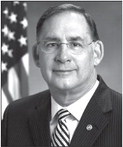A turning point in the fight against prescription drug addiction

A turning point in the fight against prescription drug addiction
I recently received a letter from an Arkansas mother who described the heartache she is experiencing because addiction is tearing apart her family. With two sons struggling with addiction, she has little resources to get them the help they need to fight their dependence.
Drug addiction impacts our country on multiple levels, with the most obvious demonstrated in the individuals who use drugs. The broader impact of addiction affects health care resources, the economy and leads to an increase in crime in our communities. That is why Congress is taking action.
We recently passed the Comprehensive Addiction and Recovery Act (CARA), legislation that provides a broad response to fight addiction by expanding prevention, education, treatment and recovery efforts.
There was overwhelming support for this legislation because heroin and prescription drug abuse is an epidemic impacting Americans from all walks of life across the country.
The availability of prescription drugs intensifies the problem. On average, more than 120 Americans die of opiate overdoses every day. According to the Centers for Disease Control and Prevention (CDC), Arkansas is one of 12 states with more painkiller prescriptions than people.
Arkansas leaders have been working to put the brakes on this number in many ways:
• Arkansas Take Back has helped remove nearly 94 tons of unneeded medication from homes in the Natural State since it launched in 2010. Eliminating expired and unwanted prescriptions from our homes helps prevent pills from getting into the hands of abusers and stops the cycle of addiction. State and local law enforcement agencies continually participate in this effort.
• Little Rock Mayor Mark Stodola is helping lead the National City-County Task Force on the Opioid Epidemic, a collaborative effort to provide best practices to help city and county officials combat this epidemic.
• The city of West Memphis is one of four communities nationwide participating in the Drug Enforcement Administration's (DEA) “360 Strategy.' This is a comprehensive strategy that enlists all stakeholders in this issue, including law enforcement, educators, health care providers, community organizations, parents and caregivers. They are working together to remove the drug traffickers, provide treatment and prevention, and to do it in a way that will have a longlasting impact for the citizens West Memphis.
CARA capitalizes on the efforts, best practices and the input of law enforcement, doctors, drug treatment advocates and patients on the path to recovery. That’s why it has the support of nearly 250 drug-fighting groups from across the country.
Addiction is a treatable disease, but only about 10 percent of those who need treatment are receiving it.
Discoveries in the science of addiction have led to advances in treatment that can help people stop abusing drugs and resume productive lives. This legislation shows the commitment to long-term recovery and will provide communities, families and law enforcement critical resources to help combat this epidemic and break the cycle of addiction.
This investment gives families with loved ones struggling with addiction, like the Arkansas mother who wrote to me, hope that recovery is possible. By pursuing proven strategies to combat addiction and supporting individuals in recovery, this comprehensive response to fighting the opioid and heroin epidemic will save lives.

From U.S. Senator John Boozman


Share